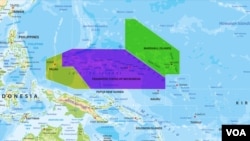More than 13,000 kilometers from Jerusalem, in the Marshall Islands, stands an Israeli consulate. It’s one of only 10 foreign missions in the Marshalls, a symbol of the strong link between the South Pacific islands and the state of Israel.
At an October 27 U.N. General Assembly vote demanding a cease-fire in Gaza, only 12 nations joined the United States and Israel in voting against the resolution. Six of those “no” votes came from the South Pacific: Fiji, Marshall Islands, Micronesia, Nauru, Papua New Guinea and Tonga. Palau abstained.
The tally reflects the outsized impact the thinly populated nations can have in the General Assembly.
“They don't have a big population, but they still have one U.N. vote,” said Holocaust historian Avi Kumar in an interview with VOA.
VOA reviewed 16 General Assembly votes related to Israel in 2022 as tallied by UN Watch, a non-governmental organization based in Switzerland. Micronesia took a pro-Israel stance on 14 of the 16 votes while the Marshalls did so 13 times.
“There is no question that these governments are very, very pro-Israel,” Kumar said.
John Hennessey-Niland, a former U.S. ambassador to Palau, told VOA the affinity dates back to a period between 1977 and 1990 when the Federated States of Micronesia, the Marshall Islands and Palau all became sovereign.
“Israel was one of the very first states to recognize these new countries as they emerged from the U.N. trustee system,” he said in an interview.
The islands’ independence was negotiated by Peter Rosenblatt, a prominent Jewish-American, who served as then-U.S. President Jimmy Carter’s ambassador to the Negotiations on the Future Political Status of the Trust Territory of the Pacific Islands.
In the years since, Fiji has accepted Israeli help with desalination and become the highest per capita contributor of soldiers to U.N. peacekeeping missions. Most of them, according to its Ministry of Foreign Affairs, serve on Israel’s southern border with Egypt.
After Hamas’ October 7 terror attack on Israel, Palau President Surangel S. Whipps condemned the attack in a letter — since shared with VOA — to Israeli Prime Minister Benjamin Netanyahu: “Our Republic and our people stand in solidarity with Israel.”
“It's a close relationship,” said Gerald Zackios who left his position as ambassador of the Marshall Islands to the United States in September. He noted that Israel was the fourth nation to recognize the Marshalls on September 16, 1987.
Ever since, Zackios said in an interview, Israel has been a key investment partner in the region, bringing a desalination plant to the Marshalls and establishing a poultry farm.
Zackios says the region and Israel share a common sense of history and values.
“The Marshall Islands is a democratic country,” Zackios said, “[And] it's a country strongly rooted in Christianity.”
Marshallese resident Jerry Kramer told VOA that the population’s majority Christian faith makes them “familiar with the stories of the Bible.”
“On Sunday a major portion of the population goes to church, and they look at Israel as the cradle of the Bible,” he said.
Kramer is Jewish. He has lived in the Marshalls since 1961 and says his 38 children, grandchildren and great-grandchildren make up most of the nation’s tiny Jewish population. He says he has regularly attended festivals and public events at the local mosque, without any fear.
“I’ve never felt any antisemitism here in the Marshalls,” he said.
A Marshallese Muslim leader tells VOA, he believes that the Marshallese people have common cause with the Palestinians but no sympathy for Hamas’ October 7 massacre in Israel.
“As a resident of the Marshall Islands, a nation who has suffered the effects of nuclear bombing, it is sad to see that the leaders of the Marshall Islands do not raise a voice against the atrocities being committed against innocent people who are being killed in Palestine,” wrote Imam Sajid Iqbal, national president of his country’s Ahmadiyya Muslim community in an email to VOA.
“As Ahmadi Muslims we are appalled by the heinous acts of violence that have been perpetrated by Hamas,” he wrote. “These acts have no place in Islam.”
Kramer is well aware of the prejudice and discrimination that trouble much of the world.
“But I’m so happy that my children, grandchildren, great-grandchildren have been brought up in a place that lives no discrimination, no prejudice,” he said.
“It should be a model,” he added.
Editor’s note: This story has been updated with a new quote from Imam Sajid Iqbal.





